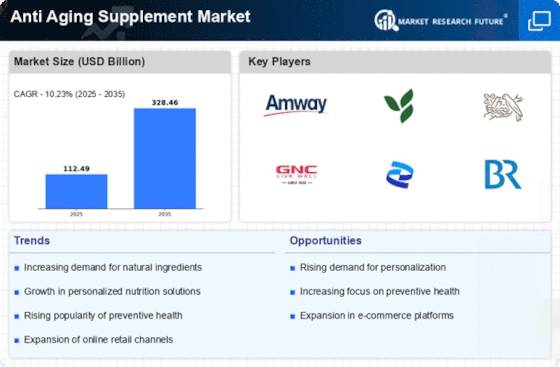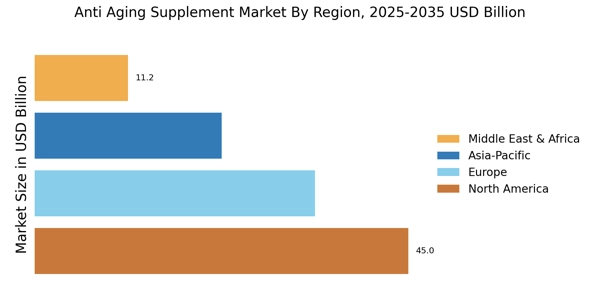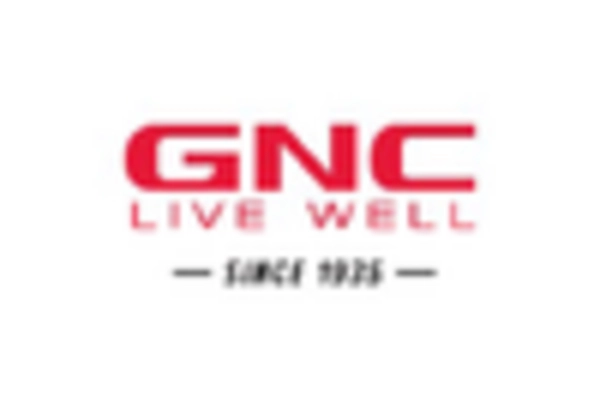Rising Aging Population
The increasing aging population is a primary driver of the Anti Aging Supplement Market. As life expectancy rises, a larger segment of the population seeks ways to maintain vitality and health. According to demographic data, individuals aged 60 and above are projected to reach 2 billion by 2050. This demographic shift creates a substantial demand for anti-aging solutions, including supplements that promise to enhance longevity and quality of life. The Anti Aging Supplement Market is likely to benefit from this trend, as older consumers are more inclined to invest in products that support their health and well-being. Furthermore, the growing awareness of age-related health issues propels the market forward, as consumers actively seek preventive measures to combat the effects of aging.
Increased Consumer Awareness
Consumer awareness regarding health and wellness is a crucial driver of the Anti Aging Supplement Market. As individuals become more informed about the impact of lifestyle choices on aging, there is a growing inclination towards preventive health measures. Educational campaigns and access to information through digital platforms have empowered consumers to make informed decisions about their health. This heightened awareness has led to an increase in demand for supplements that claim to offer anti-aging benefits. Market data indicates that consumers are increasingly seeking products that are backed by scientific research and have transparent ingredient lists. Consequently, brands that prioritize education and transparency are likely to thrive in the Anti Aging Supplement Market, as they resonate with the values of today's health-conscious consumers.
Shift Towards Preventive Healthcare
The shift towards preventive healthcare is reshaping the Anti Aging Supplement Market. Consumers are increasingly prioritizing proactive measures to maintain their health rather than merely addressing issues as they arise. This trend is reflected in the growing popularity of supplements that promote longevity and overall wellness. Market analysis suggests that the preventive health segment is expanding, with consumers willing to invest in products that support their long-term health goals. This shift is further fueled by the rising costs of healthcare, prompting individuals to seek alternatives that can mitigate age-related health issues. As a result, the Anti Aging Supplement Market is likely to experience sustained growth, driven by a consumer base that values prevention over treatment.
Advancements in Nutraceutical Research
Innovations in nutraceutical research are significantly influencing the Anti Aging Supplement Market. Scientific advancements have led to the discovery of new ingredients and formulations that demonstrate potential anti-aging benefits. For instance, research into compounds such as resveratrol and collagen has gained traction, with studies suggesting their efficacy in promoting skin elasticity and reducing wrinkles. The market is witnessing a surge in products that incorporate these findings, appealing to health-conscious consumers. Moreover, the integration of technology in supplement development, such as personalized nutrition, is expected to enhance product effectiveness. This trend indicates a shift towards evidence-based formulations, which may attract a broader consumer base to the Anti Aging Supplement Market, ultimately driving growth.
Influence of Social Media and Marketing
The influence of social media and marketing strategies is a significant driver of the Anti Aging Supplement Market. Platforms such as Instagram and Facebook have become vital channels for brands to engage with consumers, showcasing products and their benefits. Influencer marketing, in particular, has proven effective in reaching target demographics, especially younger consumers who are increasingly interested in anti-aging solutions. The visual nature of social media allows brands to highlight before-and-after results, creating a compelling narrative around their products. Additionally, user-generated content and testimonials enhance credibility, further driving consumer interest. As social media continues to shape consumer perceptions, the Anti Aging Supplement Market is likely to see increased engagement and sales, as brands leverage these platforms to connect with their audience.
.png)

















